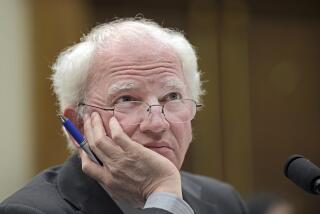Column: The principled lobbyist: George Steffes explains why real people think the government’s for rent
George Steffes was a boy standing on Wilshire Boulevard when Dwight D. Eisenhower rolled by in a motorcade, and he was mightily impressed. But that’s not what got him into politics. He went to 5 o’clock Mass one day in 1966 and ran into an acquaintance who was working on Ronald Reagan’s gubernatorial campaign. Steffes volunteered. He went to Sacramento as Reagan’s legislative aide and has been there ever since. He helped to found the first multi-person lobbying firm in Sacramento, Capitol Partners, where he’s now “senior advisor,” no longer running the firm day to day. Almost 50 years in Sacramento have given him a long view of its roller-coaster politicking, including low points like the recent indictment of state Sen. Leland Yee. The ride has left him a bit queasy.
How different was the job when you started ?
The book [of registered lobbyists in Sacramento] is now 2 1/2 inches thick, 1,500 or 2,000 registered lobbyists. The first one I remember had about 50 lobbyists in it. Companies and special interests didn’t take part like they do today. A lot of people didn’t see the need or desirability of taking part in this process, and now almost everybody does.
Lobbying got professionalized, and legislators did too.
Even after term limits, they don’t come up here — as the intention of term limits — to be citizen politicians. They are for the most part professional politicians. That’s good in a way and bad in a way.
What’s the right relationship between lobbyist and legislator?
It should be like the judicial process. In court, you are entitled to a lawyer who builds your case effectively. That’s the way I’d like the system in Sacramento and Washington to function. Many, many people who are opposed to the current [problems] are totally negative about the system itself; I’m not. I think the government system functions well and provides good things for society. I don’t mean that it can’t be better. And the money part is corrupting it.
There are a lot of good people in this Legislature. I went to a legislator on an issue. One of her main backers was on the other side from us, and we did nothing for her, not even intimating doing anything for her. And she voted for us. But [overall] you’ve got a dysfunctional Legislature. With term limits, you destroyed institutional memory of how the system was supposed to function.
What makes a successful lobbyist?
A successful lobbyist is a person who, supporting an issue for a client, can go to the office of a legislator who’s going to vote against that interest and come out having changed the legislator’s mind.
You didn’t change that mind by sliding a check across the desk?
No. In fact, if a client came to us with a single issue, like wanting a bill killed or needing a bill passed, we had a policy that the client did not give campaign contributions at all. You have one bill and you’re trying to kill it or pass it and you give money to members of the committee [handling the bill], that’s pretty obviously what you’re doing.
It’s a standard operating procedure [now]. If you were to talk to the people who do it, they’d say we’re not doing it to get a specific vote on a specific bill. We’re doing it to be part of the process. I think a lot of them believe that. My thinking was, regardless of what the reality is, what it says about the system is just wrong.
Why did the money part change?
Legislators to a great extent raised [campaign] funds in their home districts, from constituents. Today, that’s hardly a significant part of money for campaigns. That’s a huge change and not a good one. What was the cause? One was that campaigning got so much more expensive than in the 1960s. You could run for Assembly in Glendale and raise [enough] money from your friends and neighbors and the party establishment in the district. You can’t do that anymore.
When Great Britain felt the need to change their system, one thing they did was to limit the length of campaigns. I think that can really hold down expenditures. Particularly after the Supreme Court decisions, it’s Katy bar the door, as far as the ability to spend money. It’s really out of hand.
What about public financing?
I have mixed feelings about that. I’ve not always been a big proponent of public financing, but I’m getting to the point that if we can’t improve this system, then maybe we ought to have public financing. Causing taxpayers to involuntarily support people they may not [really] support still kind of gets me, but it may be better than the present system.
Last year, Assembly Speaker John A. Pérez said legislators evaluate legislation regardless of campaign contributions, and that was received with an eye roll.
Saying, “I don’t consider who’s given me money when I’m voting on an issue” — in almost all cases, legislators believe that. We believe we can rise above being influenced by people who build relationships with us and who support us at critical times. They are just kidding themselves, because we’re human beings.
The bottom line is, money at the very least buys access, and access gets results. How can you let some people spend millions buying access when ordinary people, the real people, can’t even conceive of having money for that kind of access? It’s not equal free speech, and it ought to be. Everybody ought to have free and open access to the government. Real people see the money and think the government’s for rent. It’s a shame.
Do legislators not care about public perception? There is at least a proposal to ban fundraising during the legislative session.
You’d think they’d be scrambling to change, so they could change the public perception. They take baby steps. [The proposed ban] is a step in the right direction, but you’d think they’d be taking big steps. Incrementalism is the enemy of improving the system. What they should have is an inspector general, an independent office that acts as a prosecutor when things go wrong, that weeds out the Leland Yee type of stuff. They never will; it could be an initiative!
If you were to design the system from scratch, what would it look like?
First of all, openness — open committee hearings, open argument between people. I don’t know how to do that, so don’t ask me! No. 2, an atmosphere where members realized they’d have to compromise to get anything they wanted. In the New Zealand national legislature, every committee was 50-50 between the parties. Nobody had a majority, ever. A professor I talked to said the great thing was, the atmosphere changed. [Legislators] had to get along with people who didn’t agree with them or they wouldn’t get anything. So I’d create a system where the committees are 50-50.
Apart from the money, voters are sick of partisanship bogging down the system
This partisanship is not acceptable and won’t be acceptable in the future. When [Gov. Reagan] suggested appointees, you know what the system was? If there was something wrong, the senators, controlled by Democrats, would come to us privately and say, “This guy is bad news.” They weren’t worried about [his political] philosophy, they were worried about honesty or competence. If they were right, we’d pull back. Tell me the last time that’s happened.
The campaign is the time to be partisan, to explain the differences between you and your opponent. When you’re [in office], the job is governing, and it is not bipartisan, it is nonpartisan.
Those days are gone. You can blame the Legislature, but the Legislature reflects the society.
This interview was edited and excerpted from a transcript. patt.morrison@latimes.com Twitter: @pattmlatimes
More to Read
A cure for the common opinion
Get thought-provoking perspectives with our weekly newsletter.
You may occasionally receive promotional content from the Los Angeles Times.







